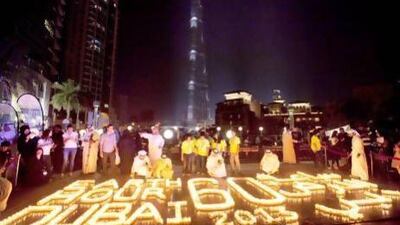Andy Ridley, the co-founder of Earth Hour, remembers being “the most nervous person on the planet” on March 31, 2007.
That was the date the environmental campaign he and his colleagues had spent years developing was about to be tested.
Their idea was to ask Sydney residents to switch off non-essential lights for an hour, and the measure of success would be if darkness descended on the city.
“You never know if something is going to work until it happens,” said Mr Ridley, chief executive of Earth Hour. “We still did not know, until the lights went off.”
They need not have worried. More than two million Sydney residents took part and landmarks such as the Sydney Opera House also stayed dark for an hour.
This year, Earth Hour was observed in 7,000 cities and towns in 154 countries.
Mr Ridley reflected on the success of the event, celebrated annually by thousands of people in the UAE, ahead of a talk he will give in Abu Dhabi next month.
With years of experience in running environmental campaigns, he was aware that most ran “more on the idea of fear than hope”, and often had limited audiences.
“We, by default, kept targeting the people who already agreed with us or those who never would agree with us,” Mr Ridley said.
“But we kept omitting the great bulk in the middle, the 60 per cent of people somewhere in the middle.”
Earth Hour was an attempt to engage a mainstream audience on environmental issues.
“Instead of thinking street protest, we were thinking street party,” he said.
“Instead of running on the idea of fear, we ran on the idea of hope. Instead of targeting a government, we tried to capture the voice and the energy of the community.
“At the beginning, one of the things that made it [Earth Hour] successful was that it just allowed the community to come together in a very broad sense.”
The next step for Earth Hour is to encourage people and businesses to take concrete steps towards tackling climate change and living more sustainably, Mr Ridley said.
The movement has already inspired action with “tangible outcomes” from as far afield as China, Uganda and Russia, where environmentalists were able to lobby for changes to marine protection laws.
Mr Ridley is addressing an Abu Dhabi audience on 21 May, joining a line-up of innovators in the environmental field at the TEDxWWF conference.
Speakers will include Andreas Keller, who is working on projects to provide renewable energy to slum dwellers in Africa, and prominent local environmentalists.
TEDxWWF will take place at the Sofitel, Abu Dhabi. Registration is online at www.tedxwwf.com.
The website will stream the event live.
vtodorova@thenational.ae

